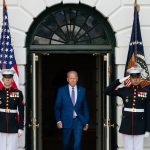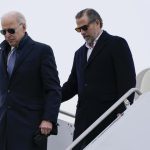President Joe Biden convened a summit at the White House, gathering leaders from across the Western Hemisphere to address a range of regional issues, encompassing migration challenges, supply chain dynamics, and infrastructure investment. This meeting occurred in the backdrop of mounting concerns regarding China's expanding presence, both militarily and commercially, in the region. President Biden underscored the imperative of bolstering economic relations and fostering competitiveness to make the Western Hemisphere the most economically dynamic region globally.
In response to China's "debt trap diplomacy," President Biden unveiled a novel investment initiative that will funnel substantial funds into sustainable infrastructure development. The objective is to present an alternative to China's Belt and Road Initiative, often criticized for burdening developing nations with debt. The leadership of this investment platform, entrusted to the U.S. International Development Finance Corporation and the Inter-American Development Bank, will prioritize key sectors, including supply chains, modernized ports, clean energy grids, and digital infrastructure.
Additionally, President Biden emphasized the collaborative efforts of the United States and the Inter-American Development Bank to enhance financial solutions for environmental and climate change projects. These solutions encompass "debt-for-nature swaps" and the issuance of "blue and green bonds." The summit's proceedings also marked the launch of the "Americas Partnership Accelerator," a program tailored to support emerging entrepreneurs in the region by mobilizing venture capital for their startups.
Biden Hosts Summit With Latin Leaders to Counter China’s 'Debt Trap Diplomacy' https://t.co/PbzWLKniwv
— Freedom Rules (@FreedomRules101) November 3, 2023
Tackling the multifaceted challenges posed by unprecedented migration flows constituted another pivotal focus of the summit. The leaders acknowledged the necessity of unified actions to grapple with this issue. Furthermore, the summit provided a strategic opportunity for the United States to reposition critical global supply chains within the Western Hemisphere, reducing reliance on China.
China's growing military and technological influence in Latin America has raised considerable alarm in Washington. With its Belt and Road Initiative and expanding infrastructure network, China has solidified its status as a significant player in the region. U.S. military leaders have voiced concerns about the security implications of China's activities, underscoring the imperative of countering its influence.
In sum, the summit showcased President Biden's commitment to strengthening economic ties within the Western Hemisphere while simultaneously striving to mitigate China's influence in the region. Through expanded investments and collaborative endeavors, the United States seeks to provide an alternative to what is perceived as China's "debt trap diplomacy" and foster a more favorable economic climate for its regional neighbors.




